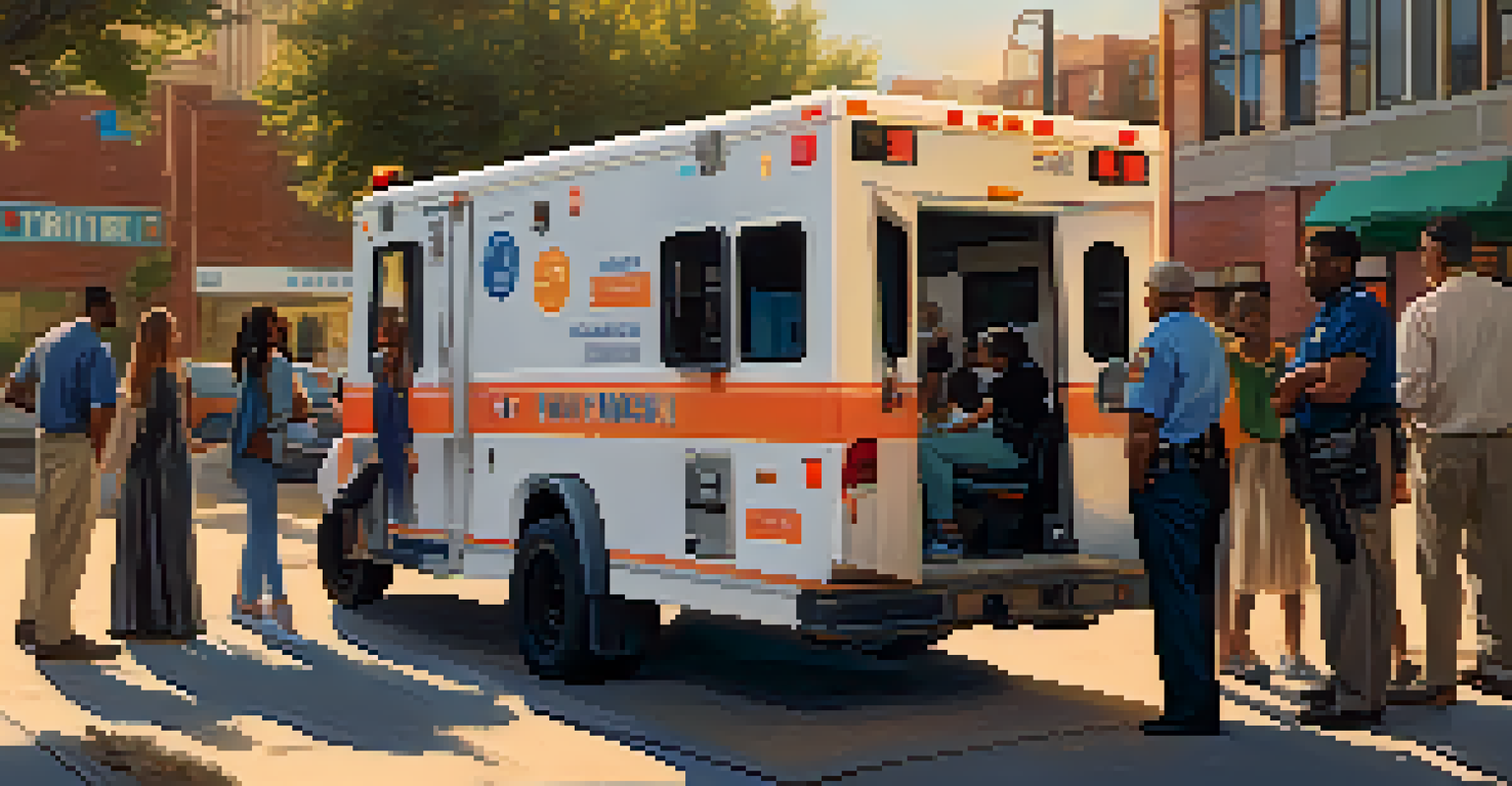The Role of Emergency Services in Mental Health Crises

Understanding Mental Health Crises and Their Impact
Mental health crises can be overwhelming and often emerge unexpectedly. These situations may involve severe emotional distress, suicidal thoughts, or even psychotic episodes. Understanding the nuances of these crises is essential for effective intervention and support.
0Mental health is not a destination, but a process. It's about how you drive, not where you're going.
Individuals experiencing mental health crises may feel isolated, confused, or frightened, making it difficult for them to seek help. This is where emergency services come into play. They act as a critical bridge between the individual in distress and the necessary mental health resources.
The impact of a mental health crisis can be profound, affecting not just the individual but also their families and the community at large. Emergency services must be equipped to respond compassionately and effectively to reduce risks and foster recovery.
The Role of First Responders in Crisis Situations
First responders, including police and paramedics, are often the first point of contact during a mental health crisis. Their training equips them to assess the situation rapidly, ensuring both the safety of the individual and the public. This initial response can set the tone for the entire crisis intervention process.

In many instances, first responders must balance the need for immediate action with the understanding of complex emotional states. They are trained to communicate effectively, using de-escalation techniques to calm individuals in distress. This approach can significantly impact the outcome of the situation.
First Responders are Key in Crises
First responders play a crucial role in assessing and managing mental health crises, often serving as the first point of contact for individuals in distress.
Moreover, first responders often serve as a liaison between the individual and mental health care providers. By facilitating access to appropriate resources, they play a crucial role in connecting individuals to long-term support.
Crisis Intervention Teams: A Specialized Approach
Crisis Intervention Teams (CIT) are specially trained groups within emergency services designed to handle mental health crises. These teams consist of law enforcement officers and mental health professionals who work together to provide a comprehensive response. Their collaborative approach offers a unique advantage in crisis situations.
The greatest weapon against stress is our ability to choose one thought over another.
CIT training focuses on understanding mental illness and effective communication strategies. By equipping responders with knowledge about various mental health conditions, they can respond with empathy and tailor their approach to the individual’s needs. This specialized training can lead to more successful interventions.
The presence of CIT can also reduce the likelihood of arrests in mental health crises. Instead of viewing the individual solely through the lens of criminal behavior, CIT emphasizes treatment and support, ultimately fostering a recovery-oriented mindset.
The Importance of Mental Health Training for Emergency Services
Training in mental health awareness is crucial for all emergency service personnel. It helps them recognize the signs of mental health crises and understand the appropriate responses. With a solid foundation in mental health principles, responders can approach situations with greater confidence and compassion.
Furthermore, ongoing training ensures that emergency services stay updated on best practices and emerging mental health trends. This commitment to education fosters a culture of continuous improvement, benefiting both responders and those they serve. In many ways, knowledge is a powerful tool in crisis situations.
Crisis Intervention Teams Enhance Care
Crisis Intervention Teams combine law enforcement and mental health professionals to provide empathetic and effective responses to mental health emergencies.
Additionally, mental health training can help reduce stigma surrounding mental illness within emergency services. By fostering an understanding and empathetic approach, responders can change the narrative around mental health, ultimately leading to better outcomes for individuals in crisis.
Community Partnerships for Enhanced Support
Collaboration between emergency services and community mental health organizations is essential for effective crisis intervention. These partnerships allow for a more holistic approach to mental health crises, where multiple resources are available to support individuals. When agencies work together, they create a safety net for those in need.
Community organizations can provide valuable resources, including immediate support services, counseling, and follow-up care. Emergency services can benefit from these partnerships by gaining access to additional tools and expertise, which can enhance their response capabilities. Together, they can create a seamless transition from crisis response to ongoing support.
Moreover, community partnerships help to foster trust between emergency services and the individuals they serve. When people feel supported by both their local agencies and mental health organizations, they are more likely to seek help during crises, ultimately leading to better mental health outcomes.
Challenges Faced by Emergency Services in Mental Health Crises
Despite their critical role, emergency services face several challenges when responding to mental health crises. One significant issue is the lack of resources, which can hinder their ability to provide comprehensive care. In many cases, emergency responders may feel overwhelmed by the demands placed on them, leading to burnout.
Additionally, the stigma surrounding mental health can complicate interactions during crises. Responders may encounter individuals who are reluctant to accept help due to fear of judgment, making it crucial for emergency services to approach situations with sensitivity and respect.
Community Partnerships are Vital
Collaborating with community mental health organizations allows emergency services to offer a more comprehensive support system for individuals facing crises.
Lastly, the legal and procedural constraints often limit how emergency services can respond. Balancing the need for immediate action with adherence to protocol can create tension in crisis situations, highlighting the importance of continuous training and reform in this area.
The Future of Emergency Services in Mental Health Crisis Response
The landscape of emergency services is evolving, particularly regarding mental health crisis response. As awareness of mental health issues grows, there is a push for more integrated approaches that prioritize compassionate care. This shift could lead to significant changes in how emergency services operate in the coming years.
Innovative solutions, such as mobile crisis units staffed by mental health professionals, are beginning to emerge. These teams can respond to crises in real-time, providing immediate support and reducing the burden on traditional emergency services. This model not only enhances care but also promotes a more holistic approach to mental health.

As we look ahead, the collaboration between emergency services and mental health organizations will continue to play a pivotal role. By working together, they can create a more effective and compassionate response system that not only addresses immediate crises but also fosters long-term recovery.